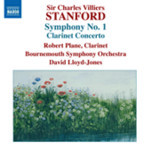
Stanford: Symphonies, Vol. 4 (No 1 / ClarinetConcerto)
 $25.00
Out of Stock
$25.00
Out of Stock6+ weeks add to cart
SIR CHARLES VILLIERS STANFORD
Stanford: Symphonies, Vol. 4 (No 1 / ClarinetConcerto)
Robert Plane (clarinet) / Bournemouth Symphony Orchestra / David Lloyd-Jones
[ Naxos / CD ]
Release Date: Monday 1 December 2008
This item is currently out of stock. It may take 6 or more weeks to obtain from when you place your order as this is a specialist product.
"The recording, from June 2007, resounds ever so warmly, the clarinet, strings, and horns quite ripe, without any hint of professional slickness that might rob Stanford's music of its spontaneous appeal."
-- Audiophile Audition, December 21, 2008
"While the "British revival" in music has been ongoing since the 1970s or even prior, I have not been exposed to much by way of Sir Charles Villiers Stanford (1852-1924), whose First Symphony (1876) has all the earmarks of the Dvorak style. Lovely, melodic expression, fluency of texture, folkish charm, and an easy way with part writing and counterpoint, all point to a thoroughly Europeanized, romantic ethos. I sense nothing of the parochial in this work, only a natural, assertive buoyancy I could have mistaken for late Mendelssohn or Schumann. The Scherzo is marked "in laendler tempo," a concession, perhaps, to more sarcastic impulses in Bruckner and Mahler, though the bucolic affect and presence of two trios mark it as a scion of Schubert or Schumann. The prominent solo violin part (from leader Duncan Riddle) comes forth modestly here, but declaims itself to noble effect in the Andante tranquillo third movement. Violins and violas com sordino open the meditative proceedings, again all highly reminiscent of Dvorak's temper. The last movement, for all its brass intricacies and somewhat Wagnerian impetus, owes debts to the Brahms penchant for classical order and repose, the contrapuntal finesse making itself unobtrusively apparent.
Like Brahms, Stanford knew clarinetist Richard Muehlfeld of the Meningen Orchestra, and meant his 1903 Clarinet Concerto for that gifted player. Muehlfeld never did perform it, but Charles Draper and later, Frederick Thurston, made the concerto their own. An appealing lyric piece, the Clarinet Concerto alternates vivacious figures with a sense of repose, and the last movement makes several allusions to the tumbler's antics of Carl Maria von Weber by way of an Irish gig or two. Soloist Robert Plane, a student of Thea King, brandishes a lovely, mellifluous tone and plastic technique, quite charming. The recording, from June 2007, resounds ever so warmly, the clarinet, strings, and horns quite ripe, without any hint of professional slickness that might rob Stanford's music of its spontaneous appeal."
--Review by Gary Lemco, Audiophile Audition, December 21, 2008
"David Lloyd-Jones and the Bournemouth SO make a strong case for this neglect work [Symphony No. 1], yielding nothing in insight or precision to the late Vernon Handley's for Chandos…The First completes Naxos's cycle of the symphonies [Vol 1 - Nos. 4 & 7 on 8.570285; Vol 2 - Nos. 2 & 5 on 8.570289; Vol 3 - Nos. 3 & 6 on 8.570355], leaving room for the Clarinet Concerto of more than a quarter-century later. This has a characteristically deft three-movement-in-one structure, centred on a slow movement of real melodic distinction. It's hard to imagine why it was turned down by its intended soloist, Brahms's favourite clarinetist Richard Mühlfield-unless perhaps he objected to changing from B flat to A clarinet during the transition to the finale?
Robert Plane is an excellent soloist, emulating the incisiveness of his late teacher Thea King on Helios and the delicacy of Emma Johnson (another King pupil) on ASV, while adding his own touches of fantasy; the orchestra provides sympathetic and well characterised support. Altogether, a valuable contribution to the continuing Stanford revival."
--Review by Anthony Burton, BBC Music magazine, December 2008
Tracks:
Symphony No. 1 in B flat major
Clarinet Concerto in A minor, Op. 80
